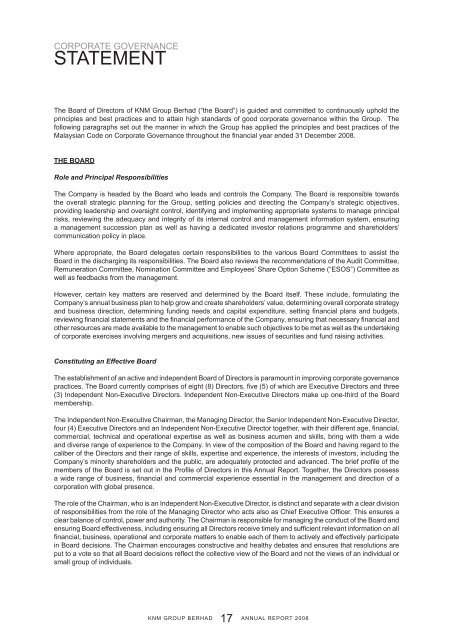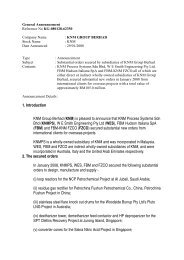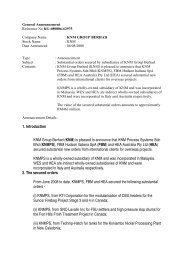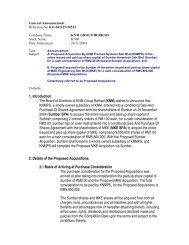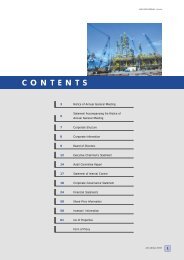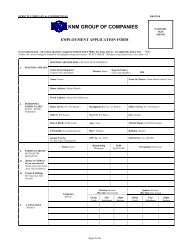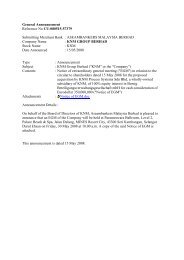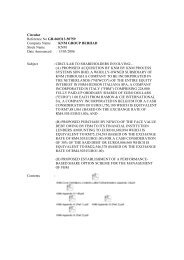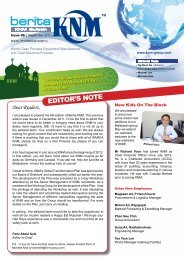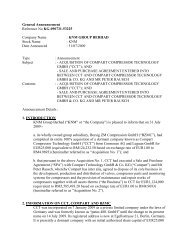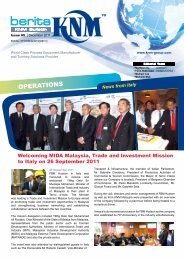ANNUAL REPORT 2008 - KNM Steel Sdn Bhd
ANNUAL REPORT 2008 - KNM Steel Sdn Bhd
ANNUAL REPORT 2008 - KNM Steel Sdn Bhd
You also want an ePaper? Increase the reach of your titles
YUMPU automatically turns print PDFs into web optimized ePapers that Google loves.
CORPORATE GOVERNANCE<br />
STATEMENT<br />
The Board of Directors of <strong>KNM</strong> Group Berhad (“the Board”) is guided and committed to continuously uphold the<br />
principles and best practices and to attain high standards of good corporate governance within the Group. The<br />
following paragraphs set out the manner in which the Group has applied the principles and best practices of the<br />
Malaysian Code on Corporate Governance throughout the financial year ended 31 December <strong>2008</strong>.<br />
THE BOARD<br />
Role and Principal Responsibilities<br />
The Company is headed by the Board who leads and controls the Company. The Board is responsible towards<br />
the overall strategic planning for the Group, setting policies and directing the Company’s strategic objectives,<br />
providing leadership and oversight control, identifying and implementing appropriate systems to manage principal<br />
risks, reviewing the adequacy and integrity of its internal control and management information system, ensuring<br />
a management succession plan as well as having a dedicated investor relations programme and shareholders’<br />
communication policy in place.<br />
Where appropriate, the Board delegates certain responsibilities to the various Board Committees to assist the<br />
Board in the discharging its responsibilities. The Board also reviews the recommendations of the Audit Committee,<br />
Remuneration Committee, Nomination Committee and Employees’ Share Option Scheme (“ESOS”) Committee as<br />
well as feedbacks from the management.<br />
However, certain key matters are reserved and determined by the Board itself. These include, formulating the<br />
Company’s annual business plan to help grow and create shareholders’ value, determining overall corporate strategy<br />
and business direction, determining funding needs and capital expenditure, setting financial plans and budgets,<br />
reviewing financial statements and the financial performance of the Company, ensuring that necessary financial and<br />
other resources are made available to the management to enable such objectives to be met as well as the undertaking<br />
of corporate exercises involving mergers and acquisitions, new issues of securities and fund raising activities.<br />
Constituting an Effective Board<br />
The establishment of an active and independent Board of Directors is paramount in improving corporate governance<br />
practices. The Board currently comprises of eight (8) Directors, five (5) of which are Executive Directors and three<br />
(3) Independent Non-Executive Directors. Independent Non-Executive Directors make up one-third of the Board<br />
membership.<br />
The Independent Non-Executive Chairman, the Managing Director, the Senior Independent Non-Executive Director,<br />
four (4) Executive Directors and an Independent Non-Executive Director together, with their different age, financial,<br />
commercial, technical and operational expertise as well as business acumen and skills, bring with them a wide<br />
and diverse range of experience to the Company. In view of the composition of the Board and having regard to the<br />
caliber of the Directors and their range of skills, expertise and experience, the interests of investors, including the<br />
Company’s minority shareholders and the public, are adequately protected and advanced. The brief profile of the<br />
members of the Board is set out in the Profile of Directors in this Annual Report. Together, the Directors possess<br />
a wide range of business, financial and commercial experience essential in the management and direction of a<br />
corporation with global presence.<br />
The role of the Chairman, who is an Independent Non-Executive Director, is distinct and separate with a clear division<br />
of responsibilities from the role of the Managing Director who acts also as Chief Executive Officer. This ensures a<br />
clear balance of control, power and authority. The Chairman is responsible for managing the conduct of the Board and<br />
ensuring Board effectiveness, including ensuring all Directors receive timely and sufficient relevant information on all<br />
financial, business, operational and corporate matters to enable each of them to actively and effectively participate<br />
in Board decisions. The Chairman encourages constructive and healthy debates and ensures that resolutions are<br />
put to a vote so that all Board decisions reflect the collective view of the Board and not the views of an individual or<br />
small group of individuals.<br />
<strong>KNM</strong> GROUP BERHAD<br />
17<br />
<strong>ANNUAL</strong> <strong>REPORT</strong> <strong>2008</strong>


